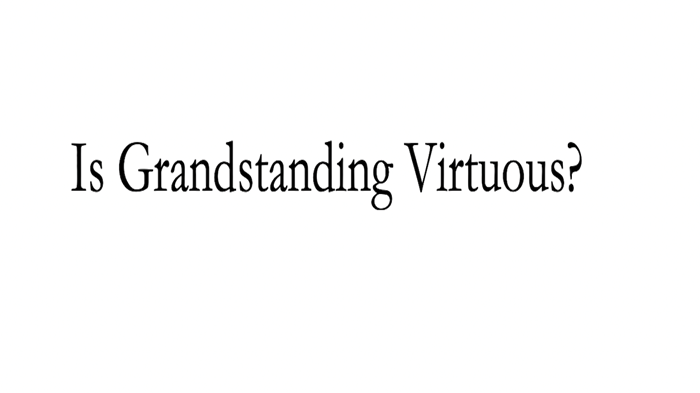Is Grandstanding ever Virtuous?

Because the meaning of “grandstanding,” which can loosely be called “peacocking,” requires definition or social media pundits will start tossing it a everyone, we begin again with the meaning. There are two elements, the desire for recognitiionm and the expression itself.
Grandstanders want to impress others with their moral qualities. We call this the Recognition Desire.
Grandstanders try to satisfy that desire by saying something in public moral discourse. We call this public display the Grandstanding Expression.
You can therefore think of grandstanding in terms of a simple formula:
Grandstanding = Recognition Desire + Grandstanding ExpressionGrandstanders try to get others to think of them as morally respectable. Sometimes they want to be thought of as one of the gang. Other times, they want to be thought of as morally exceptional. Either way, they usually want to be seen as morally better than others.
In their extensive book Grandstanding, Justin Tosi and Brandon Warmke turn the ideas and practices and consequences of grandstanding over and over and over until one has a thick description of grandstanding. Thick enough to apply to every church in the world.
Grandstanding is about moral talk and moral claims. It is about self-expression as a form of making moral claims about oneself and others.
Do virtuous people grandstand? Is moral grandstanding a sign of a defect of character?
In virtue theory one asks about motivation and they break down motivations into three categories:
Egoistic: you are concerned with yourself
Altrustiic: you are concerned for others
Dutiful: you are concerned because it is right

Humans act out of mixed motivations. But, grandstanding fits into the egoistic motivation. They write:
A grandstander contributes to public discourse because of the Recognition Desire: she wants to be seen as morally respectable. But the Recognition Desire does not appear to be either an altruistic or a dutiful motivation. Instead, it appears egoistic: grandstanders want attention. They want to be seen as morally impressive.
When it comes to civic virtue, perhaps grandstanding helps, but again civic virtue is best served not by self-promotion but by duty and altruism’s desire to do the good. Many people are heroes for their actions but who operated out of egotistic motivations. They write again:
If what you care most about is showing that your heart is in the right place, then your heart is not in the right place.
One of the perplexing complications of life is that many people do good – even in heroic ways – but who have profoundly egotistic and self desires for power and glory. Notice this:
We can be motivated to accomplish great things without having some rare set of ideal character traits. Even egoistic concerns can motivate us to do good in the world.
But one might argue grandstanding can bring good consequences (consequentalist ethics). That is, the seemingly unworthy act produces good results so the act itself becomes good. Their argument is that results do not measure virtue but that one needs to develop the character that produces good results, and grandstanding is thus not virtuous.
Vanity, too, is subjected to the same analysis. Yes, again, vain people can achieve good things but that does not make vanity virtuous, and grandstanding is vanity if it is anything.
Motivation by the Recognition Desire, their argument is, damages society. People use others; people don’t treat others well; it breeds cynicism and distrust; it creates power vacuums.
Their last section in the chp is about Nietzsche’s will to power and the drive to do the excellent thing and they deal with his idea of the “slave revolt” – the “unsuccessful tell themselves that something about themselves is valuable as consolation for their failures.” Which leads to a “revaluation of values” and it leads to the unsuccessful to use morality to satisfy their will to power. It devalues the strong and valorizes the weak. Essentially, it is to use a kind of morality to feel powerful or to asset power over others. They connect grandstanding to this use of the will to power.
People then want to dominate (knock others down to raise up oneself) others or to gain prestige (assuring yourself you are in the in-group and be recognized as such). So, even for Nietzsche, they claim, a person pursuing excellence would not grandstand because an excellent person would not use moral talk as a will to power.
Grandstanding is not virtuous and virtuous persons do not grandstand.
Next post: politicians and social activists and grandstanding.
Jesus Creed is a part of CT's
Blog Forum. Support the work of CT.
Subscribe and get one year free.
The views of the blogger do not necessarily reflect those of Christianity Today.


















